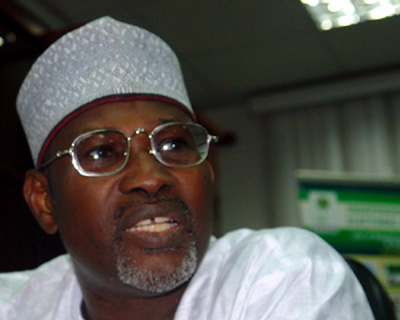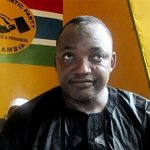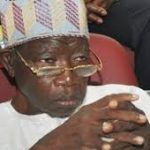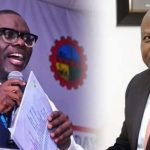Opinion: Elections And Nigeria’s Human Rights Landscape
Articles/Opinion, Latest Headlines Saturday, January 10th, 2015
By Emmanuel Onwubiko – January 2015 is a landmark month in Nigeria’s political annals because the leading political parties namely the Peoples Democratic Party (PDP) and the All Progressives Congress (APC) will spend the whole of it traversing the length and breath of Nigeria to canvass support for their Presidential, governorship, national and state assembly’s candidates in the forth coming elections scheduled to kickstart on February 14th 2015.
Already, the Presidential candidates of each of those two mainstream national political platforms have commenced practical campaign rallies across the geo-political zones even as both have also highlighted the key focus of what their parties would do if bestowed the mandate by the electorate in the polls.
The incumbent President and the presidential candidate of the Peoples Democratic Party (PDP) Dr. Goodluck Jonathan jocularly told Nigerians that his administration has so far placed premium on carrying out a forensic anti-graft campaign devoid of arbitrariness and other illegalities that offend the relevant sections of the Nigerian constitution that speak to the issue of fair hearing and respect for the principle of rule of law. Debates are still unfolding regarding the apparent weakness of the two anti-graft agencies in the last four years which resulted in their systemic failures to frontally confront corruption that has become a hydra headed monster that seems to have been made through the instrumentality of corruption and manipulations to defy all solutions.
On his part, the presidential candidate of the All Progressives Congress (APC) and an erstwhile military junta leader General Muhammadu Buhari (rtd) premised his campaign on the urgent need to restore lasting security of lives and property of the good people of Nigeria. Buhari has a very putrefying human rights records as a former military head of state who carried out several arbitrary executions and so will need to do more to market himself as a man who believes in democracy and respect for human rights.
Still reflecting on the commencement of their respective campaigns, President Jonathan in the well attended flag off of the PDP campaign had stated among others thus; “Some people say they are fighting corruption… some of you know, I am not addressing people of 20 years and below but people from 30 years and so on… Nigerians go to fuel stations and sleep overnight to buy fuel or tip those who sell fuel to buy fuel. They hoard fuel and they benefit from the hoarding. Who are those who benefited from hoarding fuel? Since we came on board, have you suffered? Do you need to bribe someone before you get fuel?”
“When the crisis of insecurity came up, we had nothing. So to get things very quickly, we used some vendors to make procurement. But now what we are doing is government to government. Now any new procurement we are doing whether for the air force, navy or army it’s government to government, so there is nothing like corruption anymore. Even if we have some issues, maybe… is that not the way to fight corruption?”
“You must prevent people from touching money, you don’t give them the opportunity or tempt them with money and this is what government is doing and we are succeeding in a number of areas in our procurement processes. The relevant agencies will address Nigerians for you to appreciate what we are doing.”
Jonathan continued thus; “They say we are weak because there were some people who took our fathers, our mothers and our uncles while they were abroad put them in a crate and flew them to Nigeria but they were intercepted by superior powers. That blocked Nigerians from even going to Britain at a time and the relationship between Nigeria and Britain… the whole world isolated Nigeria.”
So the sum total of what President Jonathan at the Lagos rally told Nigerians is that his administration has focused on respecting constitutionalism in the fight against corruption in compliance with the relevant rights-based provisions enshrined in Chapter four of the constitution.
Jonathan also lampooned his leading opponent for his anti-democratic credentials such as the ill-fated attempt his military regime made to bring back the now late Umaru Dikko who was then accused of massive corruption under the then Alhaji Shehu Shagari-led civilian administration which Buhari and his ‘Khaki boys’ overthrew in December 1983.
Undaunted by the deluge of attacks to his legendary anti-democratic records, the Presidential flag bearer of the All Progressives Congress had at the flag off of his campaign in Port Harcourt, the Rivers state capital promised to deal decisively with corrupt elements in the society. He particularly sent fears and apprehensions across the spines of most corrupt politicians and rogue business persons across the country when he vowed to send all of them to prison if the electorate should give him the mandate come February 14th 2015. A clear attribute of this candidate General Buhari [rtd] is that most Nigerians see him as being austere and therefore hates corruption with a passion and since corruption is at the root of most of our problems of underdevelopment and human rights abuses, his supporters see him as having an advantage over the incumbent.
Although most Nigerians are yet to read in greater details the comprehensive developmental blueprints of these major political players aforementioned, what is now of greater interest to Nigerians is for those political gladiators to play less of politics of name calling, mudslinging and character assassination but to dwell more on those areas and policy frameworks which they intend to introduce that will liberate majority of Nigerians from the unmitigated misery of poverty, unemployment, terrorism and general break down of law and order.
In other words, Nigerians have still not heard or read from either President Jonathan or his lead rival General Buhari how and what they have in stock to revolutionize the dwindling human rights landscape of Nigeria. What do each of them have in stock regarding bringing to an end the current regime of impunity whereby life has become so cheap that armed Islamic terrorists now bomb thousands of Nigerians to their early graves?
An existential scenario whereby Nigeria is rated as a heavily resource rich country but yet harbors some of the worst kinds of poor and impoverished citizenry globally is completely unacceptable. The World Bank recently rated Nigeria as a home to the third largest population of poor people globally. To think that Nigeria is the eight largest crude oil producing nation World wide and yet majority of Nigerians go to bed in starvation is absolutely unacceptable. Let each one of them tell Nigerians what they intend to do to retrieve the massively looted financial resources from the crude oil sector over the years.
How for instance does each of these two mainstream parties intends to address the challenges confronting the weak institutions of law enforcement to restore independence and operational efficiency to each of these vital national institutions and reposition them to more professionally carryout their legal and constitutional mandate?
Nigerians need to know how for instance any of those two political gladiators now asking for our votes intends to revive the moribund Nigerian police Force and the two anti-graft agencies and importantly, what is on their cards for eradicating the widespread regime of impunity and lawlessness? What type of policing institution will each of them give us because for now the current crop of Nigerian police force is operationally weak and ridden with indiscipline, corruption and general inefficiency. Also what is on their campaign manifesto regarding the weak procurement mechanisms in the defence and police sectors?
Why has no one among these two Presidential Candidates considered it imperative to address the issue of prison and judicial reforms because it is a notorious reality that the corruption afflicting the Judiciary and the prison sector is at the root of the regime of impunity that now reigns supreme to such a ridiculous extent that armed gangsters invade the derelict prison facilities to release their detained members?
Nigerians should be told in clear terms and given practicable time lines how and what each of these two presidential candidates would do differently in the next four years to restore sanity, discipline and professionalism to such national institutions like the Nigerian military and the Department of State Security Services (DSS) even as Nigerians are yet to hear what they have in stock regarding internal security and providing science-based security to our international borders so as to stop terrorists from infiltrating and wrecking havoc. What do they individually intend to bring on board to ensure equity in the redistribution of national wealth so all the segments of the Nigerian society will have a genuine sense of belonging?
President Jonathan is accused by the South East of failing to address the lack of federal infrastructure in that zone just as General Buhari is accused of concentrating all major projects executed by the defunct Petroleum Trust Fund which he headed then under the dictator General Sani Abacha to his Northern segment of the society. Incidentally and ironically also, President Jonathan is reportedly known to have sited more multibillion Dollars projects especially in the agro-water sectors in the North than elsewhere including his own Niger Delta section of the country.
All the above factors are essential elements that must be consolidated if the human rights situation in Nigeria is to be improved radically.
Let these two presidential candidates be reminded of the wise conclusion drawn up by a reputable global human rights figure Mr. MANFRED NOWAK in his book ; “HUMAN RIGHTS HAND BOOK FOR PARLIAMENTARIANS”.
This gentleman had written thus: “Human rights have pervaded much of the political discourse since the Second World War. While the struggle for freedom from oppression and misery is probably as old as humanity itself, it was the massive affront to human dignity perpetrated during that War, and the need felt to prevent such horror in the future, which put the human being back at the centre and led to the codification at the international level of human rights and fundamental freedoms. Article 1 of the Charter of the United Nations declares “promoting and encouraging respect for human rights and for fundamental freedoms for all without distinction as to race, sex, language, or religion” as one of the purpose of the Organization.”
With three years of incessant mass slaughter of innocent Nigerians by armed Islamists resulting in the killings of over 12,000 Nigerians there is the urgent need for these candidates to more importantly address this issue with a view to letting Nigerians know some aspects of their anti-terrorism crusade in such a way as not to give out their secret formula so the terrorists don’t steal it and beat them to their game.
It is true that in the last three and half years, the current federal administration made bold effort in partnership with the National Assembly to introduce legislative frameworks which have clearly empowered such vital institutions like the National Human Rights Commission (NHRC) and also introduced the freedom of Information Act of 2011 but it is still not what Nigerians are yearning for because the National Human Rights Commission is still battling with poor funding to such an extent that petitions on rights violations stay for much more longer than they should just as such heinous crimes like rape and human trafficking are still huge challenges because agencies that ought to fight these menaces are administered in the detestable business-as-usual fashion.
The ball is in the courts of these Presidential Candidates to market their human rights agenda so Nigerians can make well-informed choices.
+Emmanuel Onwubiko is head of Human Rights Writers Association of Nigeria and blogs @www.huriwa.blogspot.com; www.rightsassociationngr.com, www.huriwa.org.
Related Posts
Short URL: https://www.africanexaminer.com/?p=21460






















